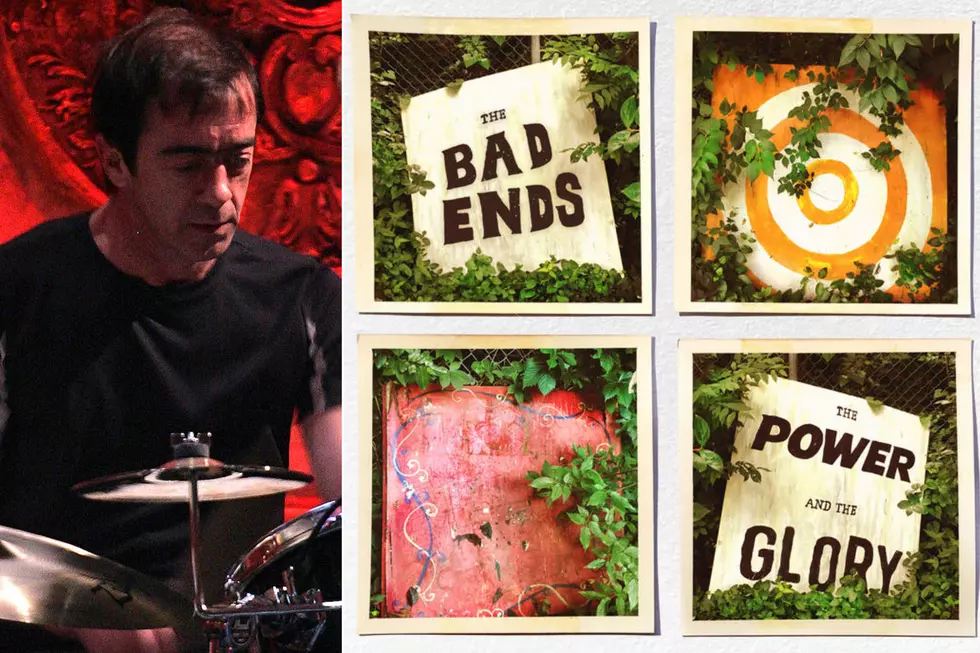
How R.E.M. Drew to a Close With ‘Collapse Into Now’
R.E.M. were still a band. Talk of a split had not been made public. Behind the scenes, however, they'd already decided that 2011's Collapse Into Now would be their final album.
"We were doing the last record, Collapse Into Now. We hadn't made an announcement or anything," guitarist Peter Buck told Rolling Stone in 2016. "We got together, and [singer] Michael [Stipe] said, 'I think you guys will understand. I need to be away from this for a long time.' And I said, 'How about forever?'" Michael looked at [bassist] Mike [Mills], and Mike said, 'Sounds right to me.' That's how it was decided."
Scott McCaughey, who'd been a touring member of the band with the late drummer Bill Rieflin for years, didn't even know. "I just thought we were carrying off the high we were on from [2008's] Accelerate and the fun we were having being a band and just making another record," McCaughey said in Tony Fletcher's R.E.M.: Perfect Circle. "I knew it would be the last record in the [Warner Bros.] contract, but to me that didn't mean anything necessarily."
R.E.M. finally confirmed their split six months after Collapse Into Now arrived on March 7, 2011, and then the album was seen in an entirely different light. Every song, every word, even every element of the recording process – the drawn-out attempt to find the right studio, a belated decision to add some key guest stars – was scrutinized anew. Turned out Stipe wasn't waving hello on the cover.
They started sessions in a surprisingly loose fashion, considering the weight of the moment. After demoing at producer Jacknife Lee's Jackpot! Recording Studio in Portland, they officially got underway with a series of lively jam-like sessions at a renovated warehouse in New Orleans called the Music Shed. A holdover from the Accelerate album along with engineers Sam Bell and Tom McFall, Lee oversaw the completion of a series of early-take tracks over just a few weeks. "It could have been Accelerate Part 2," McCaughey said in R.E.M.: Perfect Circle, "because we had a real brace of two guitars-bass-and-drums songs."
Stipe started posting intimate phone video from sessions highlighted by the emblematic "Discoverer," a track Buck sketched out in a rush after they wrapped up one night. By the time work on Collapse Into Now moved to Hansa Tonstudio in Berlin, however, the historic nature of the process had begun to sink in. Those sessions, also held over three weeks, found R.E.M. completing the album in a more somber manner. They even invited over a series of outsiders (including Eddie Vedder, Joel Gibb of Hidden Cameras and Patti Smith) for what must have felt like a farewell party.
"The only time we got really poignant was when we were working in Berlin, and they have a beautiful room there, Meister Halle, where we recorded seven or eight songs," Mills told the A.V. Club in 2011. "There was no one there really except some friends, family and significant others – and we knew that was probably the last time we would ever play together as R.E.M. That was a pretty fraught day."
Watch R.E.M.'s Video for 'Discoverer'
Lee was among those who quickly picked up on the finality of it all, realizing suddenly that their new song "All the Best" was "about the end of the band," he said in R.E.M.: Perfect Circle. "We never really spoke about it, though there were a few moments individually where we touched on it." Later, Stipe would admit: "That whole record was a whole big goodbye."
Ironically, Stipe's most recent concert performances boasted a new fission. He seemed to be giving himself to the material in a way he'd never dared before. "Once I reached my 40s, I thought to myself that if I'm going to play live now, I need to really mean this," he noted in R.E.M.: Perfect Circle. "I can't go out and be a little bit for one moment slovenly in my choices as a performer."
Then again, maybe Stipe already sensed how things were culminating – even before he could admit that sad truth to himself. "On our last tour, we were kind of going, 'Well, where could we go from here?'" Stipe said. "We could tell we were on an upswing. It was important to us that we didn't whimper out with our tails between our legs. We wanted to feel we were at the peak of our powers, and the tour felt like that."
Collapse Into Now finished with the title words, before returning with a wordless coda. Stipe felt like he'd summed up everything finally. "In my head," Stipe told Interview in 2011, "it's like I'm addressing a nine-year-old and I'm saying, 'I come from a faraway place called the 20th century. And these are the values and these are the mistakes we've made and these are the triumphs. These are the things that we held in the highest esteem. These are the things to learn from."
With that, they intended to walk away - without regrets but also without any enmity. They hadn't fallen apart amid the usual rock-band squabbles; instead they left the world's stage on their own terms.
"We felt like we made a great last record," Buck told Rolling Stone. "The last two records we made — I'm really proud of them. Accelerate is in my top five. But we got to the point where we wanted to go our own ways. We didn't want to keep doing 20-year-old songs."
Watch R.E.M.'s Video for 'All the Best'
In truth, however, R.E.M. weren't over quite yet. They later tried out a few ideas – including "We All Go Back to Where We Belong" – with Lee in their hometown of Athens, Ga., perhaps with an eye toward self-releasing some songs. In the end, they decided to package "We All Go Back" with a pair of former Collapse Into Now demos ("Hallelujah" and "A Month of Saturdays") for a compilation that arrived later the same year.
"During our last tour, and while making Collapse Into Now and putting together this greatest-hits retrospective, we started asking ourselves, 'What next?'" Mills told the Associated Press in 2011. "Working through our music and memories from over three decades was a hell of a journey. We realized that these songs seemed to draw a natural line under the last 31 years of our working together."
They never toured again, leaving the trio's March 2009 appearance at a tribute concert in New York City as R.E.M.'s last live testament. In a moment of symmetry, they joined Patti Smith for a finale performance of "E-Bow the Letter," presaging her guest turn on "Blue" – the closing track from Collapse Into Now.
"A wise man once said, 'The skill in attending a party is knowing when it's time to leave,'" Stipe said in an official statement announcing their retirement. "We built something extraordinary together. We did this thing, and now we're going to walk away from it."
Legends Who Never Had a No. 1 Single
More From Ultimate Classic Rock









